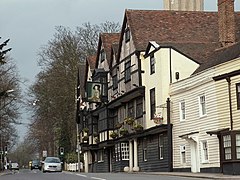Chigwell, Essex
| Chigwell | |
|---|---|
 The former Olde King's Head |
|
| Chigwell shown within Essex | |
| Area | 15.68 km2 (6.05 sq mi) |
| Population | 12,449 (2001) 12,987 (2011) |
| • Density | 794/km2 (2,060/sq mi) |
| OS grid reference | TQ435935 |
| • London | 12 mi (19 km) SW |
| Civil parish |
|
| District | |
| Shire county | |
| Region | |
| Country | England |
| Sovereign state | United Kingdom |
| Post town | CHIGWELL |
| Postcode district | IG7 |
| Dialling code | 020 |
| Police | Essex |
| Fire | Essex |
| Ambulance | East of England |
| EU Parliament | East of England |
| UK Parliament | |
| Website | Chigwell Parish Council |
Chigwell is a civil parish and town in the Epping Forest district of Essex.
According to P. H. Reaney's Place-Names of Essex, the standard guide to etymology in the county, the name means 'Cicca's well', Cicca being an Anglo-Saxon personal name. In medieval sources the name appears with a wide variety of spellings including "Cinghe uuella" and Chikewelle". Folk etymology has sought to derive the name from a lost "king's well", supposed to have been to the south-east of the parish near the border of what is now the London Borough of Redbridge. There were several medicinal springs in Chigwell Row documented by Miller Christy in his book History of the mineral waters and medicinal springs of the county of Essex, published in 1910. The proposal by 18th-century local historian Nathaniel Salmon that the "-well" element in the name derives from Anglo-Saxon weald (forest), indicating Chigwell's location in a royal demesne rather than Anglo-Saxon wielle (well) has long been superseded by modern onomastic study and is no longer credible.
The land registration map of Redbridge Council shows "Chig Well (site of)" as being located to the rear of the house located at 67 Brocket Way, Chigwell.
Traditionally a rural farming community, but now largely suburban, Chigwell was mentioned in the Domesday Book. It was later spoke about by Charles Dickens in his novel Barnaby Rudge: A Tale of the Riots of 'Eighty; the Maypole Inn is based on the King's Head inn, though the name was taken from the Maypole public house in Chigwell Row; and it is likely Dickens visited both hostelries. Dickens frequently visited Chigwell, which he described in a letter as "the greatest place in the world...Such a delicious old inn opposite the church...such beautiful forest scenery...such an out of the way rural place!".
The Chigwell civil parish was part of Epping Rural District from 1894 to 1933, with local government split between Chigwell Parish Council, Epping Rural District Council and Essex County Council. Following a county review order in 1933, Chigwell formed together with Buckhurst Hill and Loughton the Chigwell Urban District, with the Chigwell Urban District Council replacing both the parish and rural district councils. When Greater London was created in 1965 a small, more densely populated section to the southeast was transferred to the London Borough of Redbridge; this area is now known as the Manford estate and continues to be within the Chigwell post town. The rest of Chigwell Urban District was incorporated into the Epping Forest District in 1974. Parish councils were re-established for Chigwell and Loughton, and for the first time in Buckhurst Hill, in 1996.
...
Wikipedia

